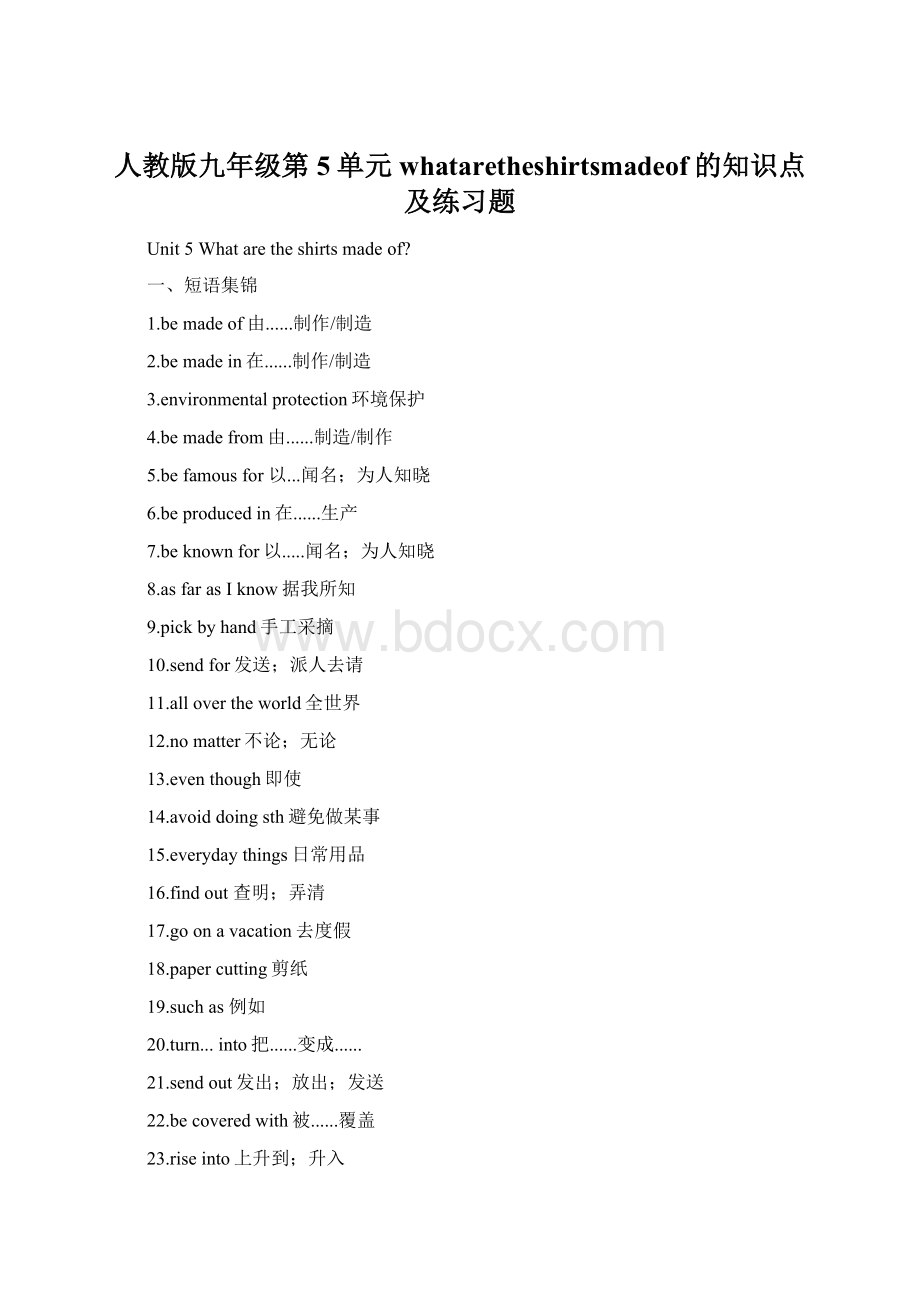人教版九年级第5单元whataretheshirtsmadeof的知识点及练习题文档格式.docx
《人教版九年级第5单元whataretheshirtsmadeof的知识点及练习题文档格式.docx》由会员分享,可在线阅读,更多相关《人教版九年级第5单元whataretheshirtsmadeof的知识点及练习题文档格式.docx(13页珍藏版)》请在冰豆网上搜索。

7.be
known
for以.....闻名;
8.as
far
as
I
know据我所知
9.pick
by
hand手工采摘
10.send
for发送;
派人去请
11.all
over
the
world全世界
12.no
matter不论;
无论
13.even
though即使
14.avoid
doing
sth避免做某事
15.everyday
things日常用品
16.find
out
查明;
弄清
17.go
on
a
vacation去度假
18.paper
cutting剪纸
19.such
例如
20.turn...
into把......变成......
21.send
out发出;
放出;
发送
22.be
covered
with被......覆盖
23.rise
into上升到;
升入
24.put
张贴
25.as
symbols
o作为......的象征f
26.fairy
tale
童话故事
27.be
used
for被用于....
二、重点解析:
1.everyday与everyday
everyday
是形容词,意为“每天的;
日常的”,用来修饰名词。
everyday
意为“每天”,在句中通常作时间状语。
用everyday或everyday填空
(1)Youcanfindthatthesentenceiswidelyusedinour____________life.
(2)David'
sfathertakesexercise______________.
2.bemadeof表示“由……制造”,通常表示从成品中可以看出原材料
bemadefrom意为“由……制成”(看不出原材料);
bemadein+地点意为“在……(地方)制成”;
bemadeby意为“被……制成”。
3.beknown/famousfor与beknown/famousas
beknown/famousfor
表示“作为……而出名”,后跟出名的原因。
beknown/famousas
表示“以……而出名”,后跟出名时的职业、身份或地位等。
4.begood+介词
begoodfor对…有好处begoodat擅长于=dowellinbegoodwith和…和睦相处
begoodto对…友善=befriendlyto
Drinkingmilkeverydayis________yourhealth.A.goodto B.goodwithC.goodforD.goodat
5.nomatterwhat“无论什么”=whatevernomatterwho“无论谁”=whoever
nomatterwhere“无论什么地方”=wherevernomatterwhen“无论什么时候”=whenever
nomatterhow“无论怎样”=however
Whateveryoulike,Iwillbuyitforyou.=__________________youlike,Iwillbuyitforyou.
6.turninto=changeinto变成turnon打开/turnoff关上turnup开大,调高/turndown开小/调低
7.英语中表示“花费”的表达
(1)sbspend时间/金钱onsthsbspend时间/金钱(in)doingsth
(2)sb.paymoneyforsth(3)sth.cost(sb.)+money(注意:
cost的主语一定是物,过去式是cost。
)
(4)Ittakes/tooksb.sometimetodosth
练习:
1.Theyspendtoomuchtime______thereport.
A.writingB.towriteC.onwritingD.write
2.--Whatbeautifulshoesyou’rewearing!
Theymustbeexpensive--No,theyonly______l0yuan.
A.spentB.tookC.paidD.cost
3.--Willyouplease______formydinnerPeter?
--Sure!
A.spendB.payC.costD.take
4.Itwill_____metoomuchtimetoreadthisbook.A.takeB.costC.spendD.pay
5.完成那项工作花了他半个小时。
It__________________halfanhourtofinishthework.
6.Howmuchdoestheticket________fromShanghaitoBeijing?
A.cost B.tookC.spendD.pay
7.Ienjoyplayingcomputergames,butIcan'
t________toomuchtime________that.
A.take;
doingB.spend;
doingC.spend;
fordoingD.take;
todo
三、被动语态
(一)语态:
英语的语态是通过动词形式的变化表现出来的。
英语中有两种语态:
主动语态和被动语态。
主动语态表示主语是动作的执行者。
例如:
ManypeoplespeakChinese. 谓语:
speak的动作是由主语manypeople来执行的。
被动语态表示主语是动作的承受者,即行为动作的对象。
例如:
Chineseisspokenbymanypeople.主语English是动词speak的承受者。
(二)被动语态的构成
被动语态由“助动词be+及物动词的过去分词”构成。
人称、数和时态的变化是通过be的变化表现出来的。
现以speak为例说明被动语态在各种时态中的构成。
一般现在时:
am/is/are+spoken 一般过去时:
was/were+spoken
一般将来时:
will/shallbe+spoken 现在进行时:
am/is/arebeing+spoken
过去进行时:
was/werebeing+spoken 现在完成时:
have/hasbeen+spoken
过去完成时:
hadbeen+spoken
(三)被动语态的用法
(1)不知道或没有必要说明动作的执行者是谁。
Somenewcomputerswerestolenlastnight. 一些新电脑在昨晚被盗了。
(不知道是谁偷的)
Thisbridgewasfoundedin1981.这座桥竣工于1981年。
(2)强调动作的承受者,而不强调动作的执行者。
TheglasswasbrokenbyMike.玻璃杯是迈克打破的。
Thisbookwaswrittenbyhim.这本书是他写的。
Yourhomeworkmustbefinishedontime.你们的家庭作业必须及时完成。
(四)主动语态变被动语态的方法
(1)把主动语态的宾语变为被动语态的主语。
(2)把谓语变成被动结构(be+过去分词)(根据被动语态句子里的主语的人称和数,以及原来主动语态句子中动词的时态来决定be的形式)。
(3)把主动语态中的主语放在介词by之后作宾语,将主格改为宾格。
Allthepeoplelaughedathim.→ Hewaslaughedatbyallpeople.
Theymakethebikesinthefactory.→Thebikesaremadebytheminthefactory.
Hecutdownatree.→ Atreewascutdownbyhim.
(五)含有情态动词的被动语态
含有情态动词的主动句变成被动句时,由“情态动词+be+过去分词”构成
Wecanrepairthiswatchintwodays. →Thiswatchcanberepairedintwodays.
Theyshoulddoitatonce. →Itshouldbedoneatonce.
(六)特殊情况
1.Hemadetheboyworkfortwohoursyesterday.→Theboywasmadetoworkbyhimfortwohoursyesterday.
2.MotherneverletsmewatchTV.→IamneverlettowatchTVbymother.
3.JackgavePeteraChristmaspresentjustnow.
→
(1)AChristmaspresentwasgiventoPeterbyJackjustnow.
→
(2)PeterwasgivenaChristmaspresentbyJackjustnow.
一、典型例题
()1.TheOlympicGames___________everyfouryears.
AareheldBwereheldC.areholdingD.willho1d
()2.Intheartshow,alotofenjoyment__toforeignfriendsbytheChinesepaintings.
A.isgivingBisgivenCwillgiveDhasgiven
()3.TodayChineseisbecomingmoreandmorepopular.It_________in.manyschoolsaroundtheworld.
A.teachesB.isteachingC.hastaughtD.istaught
()4.BaJin,oneofthegreatestwritersinChin